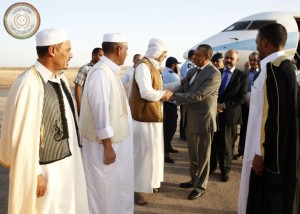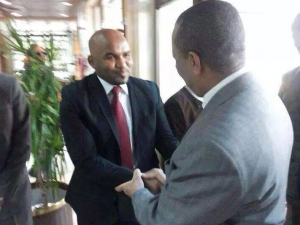By Moutaz Ali, Seraj Essul and Farah Waleed.

Tripoli, 2 July 2014:
Ras Lanuf and Sidra oil terminals were formally handed back to . . .[restrict]the Libyan government this evening in a ceremony in Ras Lanuf attended by both Prime Minister Abdullah Al-Thinni and Ibrahim Jadhran, the man who 11 months ago seized and closed them.
The spokesman for Jadhran’s Cyrenaica federalists, Ali Al-Hassi, announced yesterday that the two ports would be handed back today. When functioning normally, the two terminals are able to process half a million barrels of oil exports a day.
At this evening’s handover after Maghreb prayers, Jadhran said it would have happened earlier but for the behaviour of the General National Congress which he called “illegitimate” – a reference to the belief that it had illegally been continuing in office beyond February.
“We are handing them over as a goodwill gesture after the election of the House of Representatives which will hopefully lead the country into better circumstances,” he stated.
For his part, the Prime Minister, at the head of a ministerial delegation, said that he was delighted that Ras Lanuf and Sidra were now back in official hands “without using force”. This was “the end of the oil crisis”, he declared.
He left Ras Lanuf immediately after the handover.
Speaking to the Libya Herald afterwards, Ibrahim Jadhran said that the main aim in handing back the two terminals today was “to finish the crisis and to help the newly elected parliament to succeed. We expect the new parliament to serve the Libyan nation, free from any ideologies. The former Congress was the reason for the crisis because it has been dominated by Islamists who never think about the interest of the Libyan people”.
Cabinet secretary Ahmed Lamin put a slightly different slant on it.
“What happened today was the final phase of the agreement signed between the government and the Petroleum Facilities Guards last April. Every side fulfilled their commitments.” He added: “The Prime Minister has instructed the head of the Petroleum Facilities Guard, Ali Al-Ahrash, to make a new plan to protect the oil ports in order to prevent such things from happening in the future.”
The April deal, part of which was that the then Petroleum Facilities Guards (PFG) head Idris Buhamada should be replaced by Ahrash, its original commander, and that its HQ should be relocated to Brega, resulted in the terminals at Zueitina and Harega by Tobruk being handed back.
Commenting on today’s handover, Al-Hassi told this newspaper that not only were the Ras Lanuf and Sidra terminals being returned to National Oil Corporation control, but that all oilfields closed down by Jadhran’s supporters were also being handed over as well. He too spoke of it being a new beginning, repeating that the aim was “to give a chance to the new parliament in Benghazi to work”.
Pledging to work with the government and the House of Representatives, he likewise declared that there would be proper security in future at the terminals and oilfields. There were some technical issues which could initially affect the oil starting to flow once more, he stated, but he was confident a new page had been turned. “Today the oil crisis is over,” said a happy Al-Ahrish. “All fields will be open and ready to export,” he told this newspaper this evening.
He also said that most of the PFG had received their pay up to date, another of the points in the April deal between Thinni and Jadhran. Those who had not would do so very soon and it would be paid directly into their bank accounts, not handed over to Jadhran to pay them.








